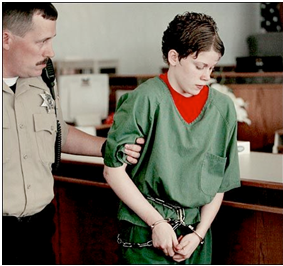Mikaela Shotwell, Student Writer, The Journal of Gender, Race & Justice
Every April, I think about an old friend of mine, Heather. It was a friendship characteristic of many for me at that early teen age—we were teammates; our interests overlapped on the softball field and we bonded over a shared love of David’s Ranch Sunflower Seeds.
In April 2001, at the age of 13, Heather participated in the murder of a man. The details of what happened aren’t particularly important, but you can read about it here. I remember Heather as bright, fun, energetic. I also remember her as immature for her age, with a tumultuous past and a truly unsettling relationship with her mother. Her mother, who was the mastermind of the murder, could barely be called such. She was verbally (and I suspected physically) abusive, more of a “friend” than a parent, and a psychological minefield all her own.
In January 2002, Heather was sentenced to 22 years for her role in the  murder. She had been tried as an adult—for a crime she committed at 13. I was—and still am—appalled at the decision to try her as an adult. I know this topic has been extensively discussed and written on, but it still resonates with me, especially every April. I often hear sound-byte criticisms of the policy of trying some juveniles as adults: “They can’t vote, but we can try them as adults?” I remember saying to my dad at the time, “Dad, she can’t even be unsupervised in hotel hot tubs.”
murder. She had been tried as an adult—for a crime she committed at 13. I was—and still am—appalled at the decision to try her as an adult. I know this topic has been extensively discussed and written on, but it still resonates with me, especially every April. I often hear sound-byte criticisms of the policy of trying some juveniles as adults: “They can’t vote, but we can try them as adults?” I remember saying to my dad at the time, “Dad, she can’t even be unsupervised in hotel hot tubs.”
 murder. She had been tried as an adult—for a crime she committed at 13. I was—and still am—appalled at the decision to try her as an adult. I know this topic has been extensively discussed and written on, but it still resonates with me, especially every April. I often hear sound-byte criticisms of the policy of trying some juveniles as adults: “They can’t vote, but we can try them as adults?” I remember saying to my dad at the time, “Dad, she can’t even be unsupervised in hotel hot tubs.”
murder. She had been tried as an adult—for a crime she committed at 13. I was—and still am—appalled at the decision to try her as an adult. I know this topic has been extensively discussed and written on, but it still resonates with me, especially every April. I often hear sound-byte criticisms of the policy of trying some juveniles as adults: “They can’t vote, but we can try them as adults?” I remember saying to my dad at the time, “Dad, she can’t even be unsupervised in hotel hot tubs.”And that’s why I have to ask: aren’t there just some ages that should be too young? Even if I were to concede (I’m not) that some juveniles should be tried as adults, isn’t there a point where we have to just say “No. Not that young.”? Every state permits juveniles to be tried as adults for certain crimes. In some states, transfer to adult court is mandated by statute for some crimes, in others, transfer is discretionary. More than half of the states currently have automatic transfer to adult court for commission of a violent felony by a 14 year-old.[1] Perhaps the automatic transfer is what’s most disturbing—there is no evaluation of the juvenile’s individual capacity to understand his actions; there is no foray into the juvenile’s susceptibility to the influence of responsible adults; there is no consideration that the juvenile could be quickly “rehabilitated.”
Despite the rational questioning I do about these policies (Does the research support their efficacy? Do they have racially discriminatory results?[2]), there is a kneejerk reaction I have to Heather’s sentence that will always control my stance on the issue. She’s just too young. Just months before the murder, the softball team had to sneak Heather into Miss Congeniality. Miss Congeniality. It was PG-13, you know.
They can’t vote, but we can try them as adults?” I remember saying to my dad at the time, “Dad, she can’t even be unsupervised in hotel hot tubs.
ReplyDeleteDallas Pool Construction
Thanks for the blog loaded with so many information. Stopping by your blog helped me to get what I was looking for. hot tub store
ReplyDelete